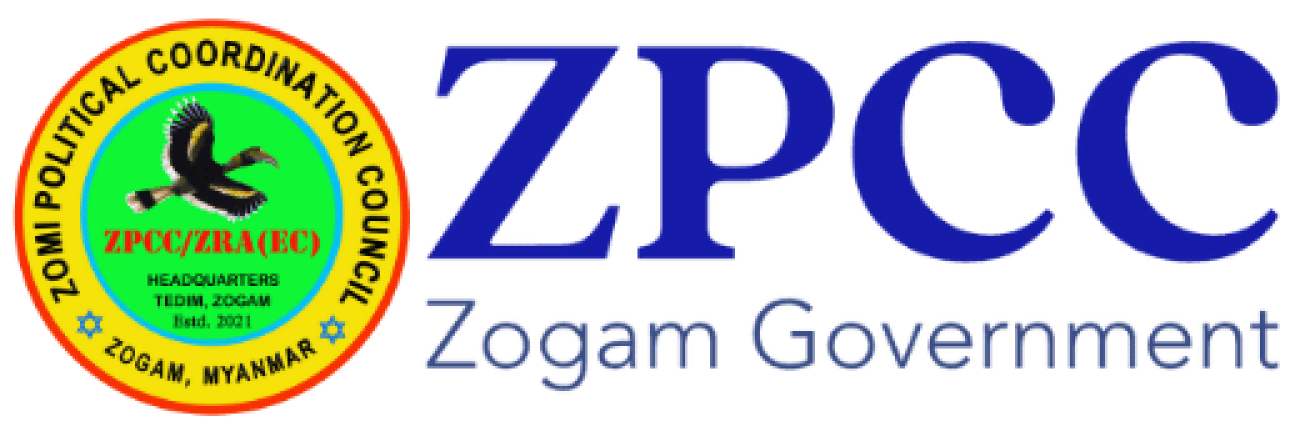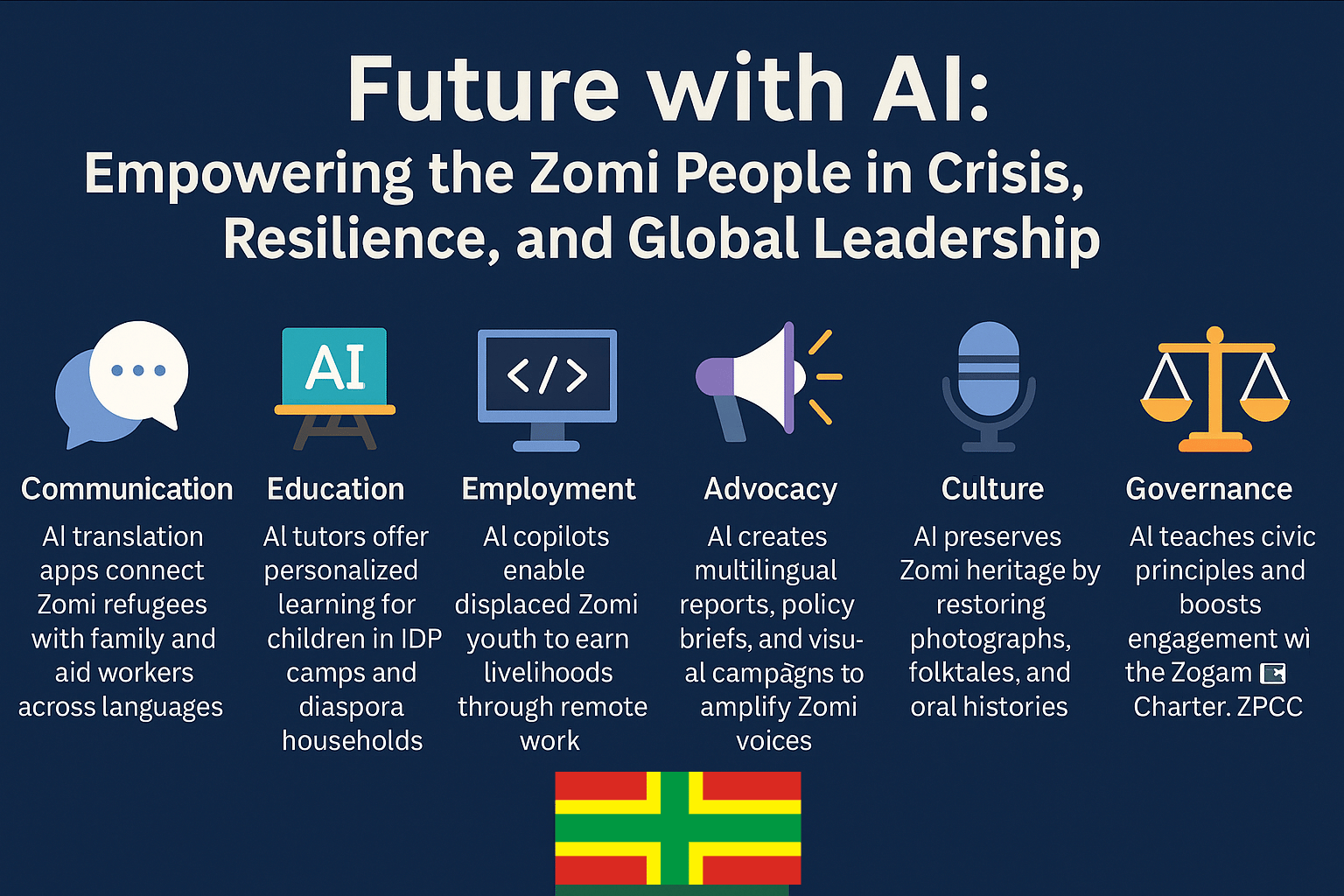Empowering the Zomi People in Crisis, Resilience, and Global Leadership
Published by the Zomi Research Institute (ZRI)
Artificial Intelligence (AI) is transforming the 21st century, advancing from experimental tools into global systems that shape economies, societies, and governance. By 2025, breakthroughs in multimodal reasoning, autonomous agents, robotics, and AI-driven commerce are redefining what is possible.
For the Zomi people—facing displacement, refugee crises, political instability, and cultural erosion—AI is not merely an innovation but a potential lifeline. This article integrates global AI developments with the lived reality of the Zomi people. It examines practical applications in communication, education, employment, advocacy, cultural preservation, and governance, while also presenting the Zomi digital ecosystem as a foundation for long-term survival and thriving.
It concludes with recommendations for the Zomi Research Institute (ZRI) and Zomi Computer & Internet Association (ZOCIA) to ensure AI adoption empowers all generations—elders, youth, refugees, and diaspora—to not only survive but thrive in the digital future.
The world is witnessing the dawn of the AI agentic era. Systems no longer only answer questions; they act, plan, and decide on our behalf. Tools like Google’s Gemini 2.5, OpenAI’s ChatGPT Agent, and Visa’s AI-powered payment networks already influence daily life.
For the Zomi people—scattered across Myanmar, India, Bangladesh, Malaysia, the U.S., and beyond—this shift is especially significant. Forced displacement, mass migration, refugee camps, and political instability have cut off traditional education, employment, and governance. In such fragile conditions, AI offers more than convenience:
- Communication lifelines for families across borders.
- Remote education for children in IDP camps.
- Digital livelihoods for displaced youth.
- Advocacy tools for exposing injustice.
- Cultural preservation in a world of erasure.
Institutions such as the Zomi Research Institute (ZRI) and the Zomi Computer & Internet Association (ZOCIA) must lead this transformation, ensuring that AI strengthens Zomi survival, identity, and leadership.
Global AI Developments (2025)
Recent breakthroughs illustrate AI’s accelerating trajectory:
- Multimodal reasoning models: Google’s Gemini 2.5 Pro combines coding, reasoning, and million-token context windows for complex analysis.
- Agentic AI: OpenAI’s ChatGPT Agent and Microsoft Copilot Tuning execute multi-step workflows, from research to travel planning.
- AI in commerce: Visa pilots AI agents for automated purchases; OpenAI, Google, and Perplexity release shopping agents.
- Coding AI: xAI’s Grok-Code-Fast-1 accelerates code development for affordability and speed.
- Workforce integration: Salesforce replaced 4,000 support jobs with AI agents, highlighting both efficiency and displacement risks.
- Localized assistants: India’s Kruti provides low-bandwidth, multilingual AI access, inspiring similar applications for Zomi.
- Robotics: DeepMind’s Gemini Robotics On-Device enables autonomous, offline-capable robotic assistants.
These developments provide a foundation to adapt AI for Zomi needs in crisis and diaspora contexts.
Applications for the Zomi Context
1. Communication for Families in Crisis
- Use: AI translation apps connect refugees to aid workers across Zomi, Burmese, Hindi, English, and more.
- Benefit: Keeps families connected across displacement.
- Future: ZOCIA could develop a Zomi Voice Assistant for elders and refugees.
2. Remote Work and Livelihoods
- Use: AI copilots and freelance platforms enable displaced youth to earn through transcription, coding, and design.
- Benefit: Creates financial independence for families in camps.
- Future: ZRI can establish AI Job Labs with diaspora mentorship.
3. Remote Education and Lifelong Learning
- Use: AI tutors provide personalized lessons in camps and diaspora households.
- Benefit: Prevents lost generations of uneducated Zomi children.
- Future: Launch Zomi Digital Schools, combining culture, language, and modern curricula.
4. Advocacy and Political Struggle
- Use: AI creates multilingual advocacy reports, policy briefs, and visual campaigns.
- Benefit: Amplifies Zomi voices in international forums.
- Future: Train AI Advocacy Fellows through ZRI.
5. Cultural Preservation
- Use: AI restores photographs, animates folktales, and digitizes oral histories.
- Benefit: Protects Zomi heritage for future generations.
- Future: ZOCIA could build a Zomi Heritage Cloud, archiving all digital content.
6. Elders and Vulnerable Populations
- Use: Voice-based AI reads Zomi scripture, reminds elders of medicines, and connects them to family.
- Benefit: Ensures inclusivity across generations.
- Future: Create Zomi Elder AI Companions.
7. Migration and Mobility
- Use: AI travel agents streamline visa processes and bookings.
- Benefit: Guides displaced families through legal migration safely.
- Future: Partner with NGOs to launch a Zomi Migration AI Guide.
The Zomi Digital Ecosystem
The Zomi already maintains a vibrant digital infrastructure that AI can amplify:
- 🌐 Zomi Cloud – Secure file hosting and sharing.
- 📖 Zomi Dictionary – Online dictionary for language preservation.
- 📚 Zomi Language & Literature Resource Center – Vocabulary, grammar, and literature hub.
- 🎨 Zomi Gallery – Digital art and cultural exhibits.
- 📷 Zomi Photos – Photo archiving and cultural storytelling.
- 🎓 Zomi Research Institute – Policy, academic, and AI research center.
- 💻 Zomi Codes – Programming and innovation hub.
- 📰 Zomi Press – Trilingual news media.
- 🇺🇸 Zomi Community USA – Diaspora cultural platform.
- 🌍 Zomi.ws – Multi-purpose community portal.
- 🧑🤝🧑 Zomi.me – Personal and community storytelling site.
- 📜 Zogam Charter – The constitution of the Zomi people.
- 🏛️ ZPCC – Political Coordination Council, interim governance.
- 👩💻 Zomi Dev – Developer and coding resource.
- 🎞️ Zomi Download – Educational and cultural video access.
- 🌐 Zomi.net – General community information portal.
Together, these platforms form a Zomi Digital Nation—a virtual homeland where refugees, diaspora, and homeland remain connected.
Recommendations
- Education: Launch AI-powered Zomi Digital Schools.
- Employment: Train youth in digital jobs, supported by diaspora mentors.
- Advocacy: Expand AI-enhanced content for global visibility.
- Culture: Archive folklore, songs, and oral traditions with AI restoration.
- Elders: Build Zomi Elder AI Companions for inclusivity.
- Governance: Use AI chatbots trained on Zogam Charter and ZPCC to teach civic principles.
- Integration: Develop a Zomi Super-App combining dictionary, press, cloud, and research.
The Zomi story is one of resilience. Despite war, exile, and marginalization, the Zomi have preserved faith, language, and culture. In the AI age, survival must give way to thriving.
AI is not just for Silicon Valley or Beijing—it can belong to Zogam. From refugee camps to diaspora classrooms, from elders in villages to students abroad, every Zomi can harness AI. With courage and unity, the Zomi can leap from crisis to leadership, ensuring their voice, culture, and future shine in the digital age.
AI in 2025 represents both opportunity and risk. For the Zomi, it is a path to resilience, empowerment, and nationhood. If guided wisely by ZRI and ZOCIA, AI can become the foundation of a thriving Zomi future.
The Zomi must claim their place in the AI-driven world—not only to survive, but to lead.


